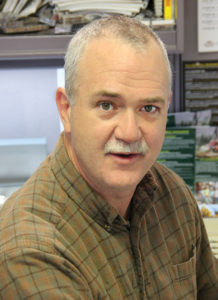Oregon Facing Danger Signs
Article by Dan Shell, Senior Editor, Timber Processing April 2024
 The state may be the top U.S. lumber producer right now, but log supply in Oregon the past 30 years or so has been an uneasy balance of private, federal (Forest Service and Bureau of Land Management) and state timberlands. Now, with state and private timber owners taking a regulatory harvest reduction, it’s more important than ever for federal officials to meet—and ideally increase—timber harvest levels to help maintain that balance.
The state may be the top U.S. lumber producer right now, but log supply in Oregon the past 30 years or so has been an uneasy balance of private, federal (Forest Service and Bureau of Land Management) and state timberlands. Now, with state and private timber owners taking a regulatory harvest reduction, it’s more important than ever for federal officials to meet—and ideally increase—timber harvest levels to help maintain that balance.
Officials with the American Forest Resource Council (AFRC) are sounding the alarm after three mill closures announced in Oregon this year: Hampton Lumber’s Banks mill, Interfor’s Philomath mill, and a two-year sawmill closure announced by Rosboro in Springfield while a new glulam plant is being constructed. In all three cases, the companies involved cited ongoing uncertainty over log supply as contributing to the closure decisions.
Also adding to raw material concerns is the ongoing impact of Oregon’s September 2020 wildfires that burned 971,000 acres of timberland and destroyed 15 billion BF of green timber with more than $30 billion in end-product value, according to an Oregon Forest Resources Institute report.
AFRC President Travis Joseph and organization members are urging the Pacific Northwest congressional delegation to take steps to help reverse the trend of more mill closures. This includes more active oversight to ensure the FS and BLM meet and increase timber harvest goals.
Maintaining a healthy and robust forest industry sector is also a key component of addressing federal forest health and wildfire issues. An additional $6 billion outlay to the FS and BLM to increase the pace and scope of forest treatments and stewardship projects hasn’t yielded an uptick in log supply that traditionally accompanies such projects, Joseph says, noting that the BLM’s western Oregon timber sale program this year has been arbitrarily reduced by more than 25%.
The group is also taking the long view on the issue of maintaining a vibrant forest industry sector. The cautionary tale is Arizona, where years of federal forest management neglect allowed forest industry infrastructure to almost disappear. And now, the state is still struggling to develop the timber processing and utilization facilities to make a difference in forest health operations.
There’s also the role of wood building materials and other wood products that sequester carbon permanently and help decarbonization efforts. It’s a sustainable industry that produces sustainable products.
Joseph adds: “If the Federal Government is going to be successful in addressing the current federal forest health and wildfire crises – and protect the extraordinary social, environmental, economic, and cultural values of our public lands – it must sustain and grow the forest infrastructure and related workforces.”
Latest News
AWC Will Receive $6 Million Grant
AWC Will Receive $6 Million Grant American Wood Council (AWC) has been selected for a $6 million grant from the Environmental Protection Agency (EPA) to increase transparency in the U.S. wood product industry by further developing Environmental Product Declarations...
SFPA Announces Sawmill Safety Award Winners
SFPA Announces Sawmill Safety Award Winners Southern Forest Products Assn. announced the recipients of the John Edgar Rhodes 2023 Sawmill Safety Excellence Awards. The awards embody the impact, dedication and legacy of the association’s founding leader, John Edgar...
Carbotech Group, Finnos Announces Partnership
Carbotech Group, Finnos Announces Partnership Carbotech Group is pleased to announce a collaboration agreement with Finnish company Finnos. As a result of the agreement, Carbotech Group will become the exclusive distributor of Finnos’ innovative products. ...
Remembrances Every Five Years
Always one to have fun with numbers, let’s have some fun now. You’ll notice that this issue marks the 46th time Timber Processing has published the Annual Lumbermen’s Buying Guide. That means the first one was published in 1979. So, beginning with 1979, and in five-year intervals, here are some tidbits that were also published in the Buying Guide in those respective years.
Weyerhaeuser Curtails New Bern Sawmill
Operations at Weyerhaeuser’s sawmill in New Bern, NC have reportedly been curtailed.
Find Us On Social
Newsletter
The monthly Timber Processing Industry Newsletter reaches over 4,000 mill owners and supervisors.
Subscribe/Renew
Timber Processing is delivered 10 times per year to subscribers who represent sawmill ownership, management and supervisory personnel and corporate executives. Subscriptions are FREE to qualified individuals.
Advertise
Complete the online form so we can direct you to the appropriate Sales Representative.
